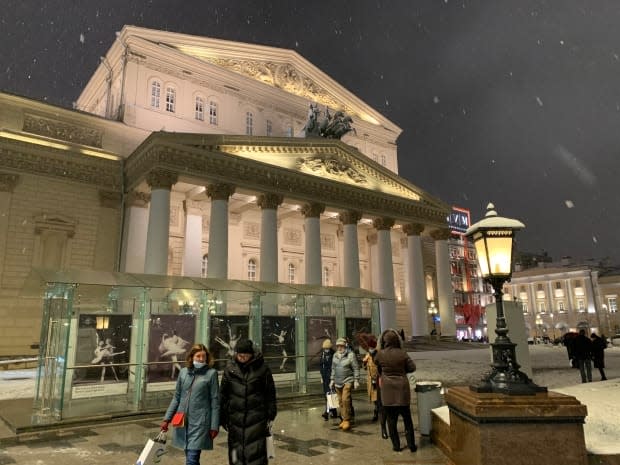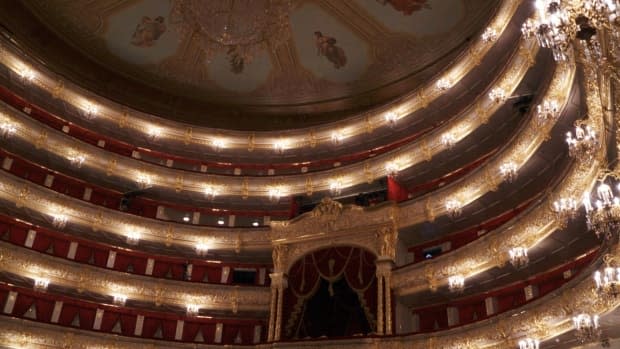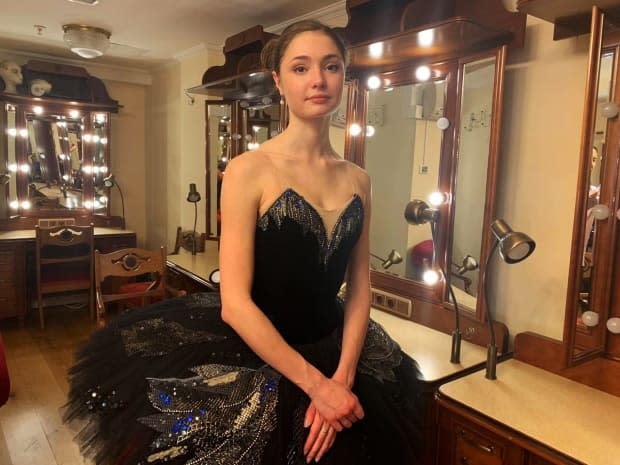How Russia's famed Bolshoi is dancing its way through the COVID-19 pandemic

The performers at Russia's majestic Bolshoi Theatre have danced their way through the Bolshevik revolution, bombing by the Nazis in the Second World War and the disintegration of the Soviet Union, but surviving the COVID-19 pandemic may be their greatest challenge yet.
The historic Moscow landmark closed for six months over the spring and summer as the city went into a lockdown to try to curb the spread of the coronavirus, but it reopened this fall for a 245th season and is attempting to stage a busy schedule of Christmas season events.
"It's incredibly difficult," said prima ballerina Yekaterina Shipulina, 41, during a recent break in rehearsal where she was dancing Preludes to Bach as part of a tribute to Russian ballet great Maya Plisetskaya.
"We are in this … dilemma where we actually can't social distance. We have to take our masks off to perform and be shoulder to shoulder with our dance partners," she told CBC News backstage at the Bolshoi.
"But there's this term, 'stage therapy' and that's what's happening now," she said of the intensive group effort that's been required to rehearse and perform despite the restrictions.
"We take energy from [the audience] and we give energy."

Within days of the theatre reopening this fall, 30 performers and workers out of more than 3,300 tested positive for COVID-19.
The number is even higher now, with more than 100 employees off work.
It's unclear how many of those are dancers, but for the Plisetskaya tribute, three dancers had to be replaced at the last minute because either they or a close family member had contracted the virus.
In normal circumstances, the ballet would also be hosting guest dancers from around the world in prominent roles, but not now.
Costly closure
The financial implications for the Bolshoi have been dire.
The six-month shutdown cost the theatre roughly $15 million Cdn, prompting director Vladimir Urin to warn the venue's future was at risk.
Right now, tickets, which can range up to $200 US each, are being sold for just 25 per cent of the seats in an auditorium that usually seats more than 2,000. Until mid-November, half the seats at the ballet performances were full, but capacity was further reduced as infection rates in Moscow soared.
WATCH | How a gala ballet production comes together in a pandemic:
Russia is the fifth most-infected country in the world and has been consistently registering more than 25,000 new cases a day for the past 10 days. Moscow has been seeing from 6,000 to 7,000 new cases a day and the city's mayor has acknowledged the hospital system is "under great pressure."
In Canada, the National Ballet of Canada has cancelled the remainder of its 2020/2021 season and it is unclear when performances will begin again.
The Royal Winnipeg Ballet cancelled its 80th season in March and this Christmas for the first time in 20 years there will not be a production of The Nutcracker.
The Bolshoi hosts the world's largest ballet company, with more than 200 dancers. The interior walls of the building's ornate, gold-leafed rooms are adorned with photographs of world figures and celebrities who have visited over the decades.

The director of the Plisetskaya tribute insisted it would be a catastrophe if the dancing were to stop for the pandemic.
"It's in our nature," said Andris Liepa, who as a dancer, choreographer and director has had a long association with the Bolshoi Ballet.
He heads a ballet troupe in Tashkent, Uzbekistan, but travelled to Moscow for the Plisetskaya production.
Personal risk
"People should feel that life is going on, and if you close the theatres and close the concerts, then people feel more suffering just by not having the chance to be part of that … culture."
He said everyone who performs has to accept some risk.
"You cannot perform without being close to each other. The pas de deux [duet] has to be done as close as possible — sometimes we roll over each other, going over and over the bodies getting very close," he said, using his hands to illustrate two dancers weaving their bodies together.
His own personal risk now, however, may be lower than others as he contracted the coronavirus a few months back and spent weeks at home in bed with a high fever.
"We are more careful now because we are wearing masks, we are always doing tests," he said referring to the precautions at the theatre for cast, crew and spectators.

In fact, very few of the dancers or performers that the CBC News crew saw during the dress rehearsal were wearing masks.
Shipulina, the prima ballerina, was the notable exception.
"I'm always in a mask. I only take it off for the real performance," she said.
Most members of the orchestra, who were crammed together tightly beneath the front of the stage, were not wearing masks. Bolshoi officials told CBC News that rules on wearing masks are up to individuals but it didn't appear the conductor or many of the other musicians were covering their faces.
Social beings
On the performance night, patrons were getting their temperatures checked at the door but once inside the theatre, many wore their masks low underneath their noses.
"We are social beings, we can't be without this," ballet goer Tatiana Telokova said on continuing with the performances during a pandemic.
"This is the main theatre of the country so the government has to think about this if there are hard times."
WATCH | A young Russian ballet star keeps dancing during COVID-19:
One of the Bolshoi's rising stars, 22-year-old ballet dancer Alyona Kovaleva, told CBC News she is strongly in favour of keeping the Bolshoi open despite the significant risk of infection, but she personally finds wearing a mask while dancing during rehearsals too uncomfortable.
"It's really hard. I tried it once — but I can't," she said.
Kovaleva missed out on dancing a new lead role because of the summer shutdown and said it was very hard to practise and stay prepared.
"It was a disappointment. We all stopped and were thrown from our usual world, from our lives and how we used to see them," said Kovaleva.

"This was the biggest thing we missed during the quarantine and the time away from the theatre — this feeling of entering the stage, of giving your emotions and then receiving the energy back from the audience.
"I think we have to dance and perform as long as we are able to."

